- Home
- Jess Foley
Saddle the Wind Page 7
Saddle the Wind Read online
Page 7
After a moment she said, ‘Yes, Mr Savill. We can do what you want, I’m sure.’
‘You think your husband will agree?’
She gave a slow nod, then she said, ‘I don’t need to ask Oliver. I know what his answer will be. It’ll be the same as mine.’ She smiled, an uncertain smile, then added, as if forcing a positive note into her voice, ‘Yes, sir, if you need Blanche up at the house for a time then you must have her.’
A few minutes later when all the arrangements had been made he prepared to go. Standing before her he reached out and took her hand. ‘Thank you,’ he said. ‘Thank you, so much.’
As he withdrew his hand his eyes were caught again by the pictures around the walls, and suddenly he was aware of a significance that had previously missed him. ‘It’s just struck me,’ he said, ‘– your pictures – they’re original oils – they’re not prints.’ Then immediately he regretted his remark, afraid that it might have been taken to imply that people in the Farrars’ situation shouldn’t have original paintings. The woman merely smiled, though, and said, ‘Oh, yes, sir, they’re all original.’
He shook his head in a little gesture of wonder. ‘It’s like a picture gallery,’ he said. He paused. ‘I’m no expert, but they look to me to be of very fine quality.’ He noticed then that not all the pictures were framed – and that the frames that had been used were mostly very old and shabby or else had obviously been cheaply and simply made.
He took a step closer to the painting on the wall immediately to his right. It showed a tranquil scene of a shepherd and a flock of sheep on a hillside. He gazed at it for long moments then moved on a step to look at the next picture. It depicted a harvest scene, the workers, men, women and children, gathering up the stooks and placing them in rows. The scene was drenched in sunlight. Savill could almost feel the sticky, almost airless, heat of the day. Who could have done such work, he wondered – and then his eye caught the signature, written small in the lower righthand corner: Oliver Farrar – and beside it: 1879. He turned to the woman.
‘Your husband,’ he said wonderingly, and shook his head. ‘They’re done by your husband. I had no idea he had such talent. They’re beautiful.’
At his words he saw pride in her eyes. She smiled. ‘Thank you, sir. I’ll tell him what you said when he comes in. He’ll be pleased.’
He turned and gave his attention to the paintings again, looking at them one by one as he moved slowly around the small room. There were nine of them altogether, landscapes, still-lifes, portraits, and studies of figures in domestic scenes.
‘When does he find the time to do them?’ he asked.
‘At the weekends – on his time off on Sundays. Just about any spare minute he can find.’
‘Does he sell them?’
She raised her eyebrows in surprise. ‘Sell them, sir? How would he do that?’
‘Well – I should think he’d be able to. And perhaps for quite considerable sums.’
‘– Really, sir?’
He nodded. ‘I would think so. I don’t know. I’m no expert, but I should think he could take them somewhere. To the city. To Bath or somewhere – or even up to London. There must be somebody there who would be interested.’
She smiled. ‘It needs time and money to go traipsing off like that, sir.’ Then she added: ‘Though it doesn’t stop him – not selling them, I mean. I should think whatever happened he’d still go on painting. It’s all he thinks about.’
Savill thought again of the time he had gone to talk to Oliver Farrar in the garden, and suddenly, now, he could understand him better. If a man had such a thing as this inside him – this talent eating away at him with no real outlet for it, it wasn’t to be wondered at if he gave the air of having things on his mind apart from gardening.
After a moment Savill prepared to leave and the woman opened the door. He thanked her, said he hoped he hadn’t taken up too much of her time.
She shook her head. ‘Oh, no, sir. There’s a while yet before my other children get back from school.’
‘D’you have to go and meet them?’
‘No – Mrs Hewitt, my neighbour, will do that when she meets her own boy.’
‘I see.’ He hesitated on the threshold of the room. ‘Did I understand from what you said earlier that one of your children is in bed?’
She nodded and glanced upwards. ‘Yes, my little boy Arthur. You met him the other day when I was up at the house.’
‘Yes, I remember … Is he ill?’
She nodded. ‘He has asthma. He’s had it since he was a baby and – well, I’m afraid he’s not – not as strong as the others.’
‘I see. He’s been having some bad attacks lately, has he?’
‘Yes, he has.’
‘Have you had the doctor to him?’
‘Yes. But he’s never able to do much.’
‘Which doctor do you have?’
‘Dr Harmon.’
‘I don’t want to interfere,’ Savill said gently.
‘It’s all right, sir.’
Her voice sounded overly bright. It didn’t convince him, though. She might be strong and proud, he thought, but where her children were concerned she was very vulnerable.
When John Savill had gone Sarah got the baby ready, left her in the makeshift pen and went upstairs to the children’s bedroom. There Arthur lay in the half-light that came in through the thin curtains. As she bent over the bed he smiled up at her.
‘Hello, Artie,’ she said softly. ‘Did I wake you?’
‘No, I was awake.’
‘How do you feel now?’
‘All right.’ He nodded his head on the pillow.
In spite of his assurance she could hear the slight wheezing in his breath that signalled the obstruction there. He had been awake for so many hours in the night, and to prevent the other children being kept awake too, Sarah had brought him downstairs until the worst of the attack had passed. Now, gently, she laid her hand on his forehead, leaned down and kissed him on the cheek.
‘I’ve got to go out for a few minutes when Ernest and Mary come in from school,’ she said. ‘But Mrs Hewitt will be coming in from next door while I’m gone. I’ll try not to be long. And when I get back I’ll make you something nice for your tea.’ As she straightened she heard the sound of children’s voices from below. ‘There’s Ernest and Mary now,’ she said. She moved back to the door. ‘You’re sure you’ll be all right?’
‘Yes.’
Downstairs she found Ernest and Mary insisting, as usual, that they were hungry, and she quickly made them sandwiches of bread and jam while she told them that she had to go up to Hallowford House with Blanche.
‘What for?’ Ernest asked.
‘Because she’s going back there to stay for a little while.’
‘Why?’
‘Because,’ she said, ‘Mr Savill’s little girl is missing her, and wants her back again.’
At her words she saw a look of disbelief appear on his face. To his nine-year-old wisdom such a notion was incredible – the idea that anyone could actually want the company of a crying baby was beyond him.
Mary asked then if she could go as well and quickly Sarah washed her face and made sure she was presentable. As she combed Mary’s hair she said to Ernest, ‘Mrs Hewitt is coming in to mind Artie for a while.’ She urged him towards the door. ‘Go and see her now and tell her we’re ready to leave, will you?’
A minute later Ernest was back with Esther following, and Sarah took up the baby from the rug and put her into the perambulator. Then, with Mary and Agnes beside her, she set off up the hill.
On reaching Hallowford House they crossed the yard to the back door. There in the little room just inside, Sarah left the perambulator and lifted Blanche, now crying, up into her arms. Then, leaving Mary and Agnes in the kitchen with Florence, she went upstairs to the nursery.
Ellen Jessop was expecting her. When Sarah went into the room she found Marianne lying on cushions within the pen near the window.
Sarah placed Blanche, still crying, in Ellen’s arms. Marianne, disturbed by Blanche’s noise, began to cry. ‘Do you want some help with them?’ Sarah asked.
‘No, thank you. I’ll manage all right.’ Ellen guarded her task jealously, and now Blanche as well as Marianne was her responsibility. ‘It’s time Miss Marianne had her sleep,’ she said. ‘I’ll put Blanche in the crib with her. They’ll be all right once I get them settled together.’
Sarah nodded and moved back to the door. In the doorway she said, ‘I’ll go on downstairs, but if you don’t mind I’ll look in again before I go – just to see that Blanche is all right.’
Blanche was still making her irritable little crying sound as Sarah went from the room.
In the kitchen Sarah found Agnes and Mary sitting at the scrubbed, wide table eating slices of fruit cake and drinking glasses of milk. Agnes looked up at her with the milk painting white her upper lip and Sarah grinned at her. For the next fifteen minutes Sarah remained in the kitchen talking to Florence then left to go back upstairs.
There was silence this time as she stopped outside the nursery door, and she hesitated before tapping lightly upon it. A few seconds later the door was opened and Ellen stood there with a warning finger up to her lips. She stood aside then and very softly Sarah entered. There was no sound now from Blanche or Marianne. Whispering, Ellen gestured towards the crib. ‘Go and look at them.’
Sarah moved silently across the room to the crib and looked down at the two infants. They were sleeping soundly, Marianne’s head close to Blanche’s.
A minute later Sarah whispered goodbye to Ellen and let herself out. When she had closed the door behind her she stood for some moments on the landing. No sound broke the quiet.
How would Ollie feel when he learned that Blanche was back at Hallowford House? she wondered. But, as she had known the answer to that question when Mr Savill had come to see her, so she knew the answer now. Ollie would probably be relieved to have Blanche away from the cottage again for a while. Since her return home there was no doubt that her crying and fretfulness had disturbed him and got in the way of his work.
Sarah turned her head, listening. Still no sound came from behind the nursery door. For the time being Blanche was content and had ceased to have any need of her. But there, she told herself as she moved towards the stairs, Blanche had rarely seemed to belong to her since the moment of her birth.
When she got downstairs she called Mary and Agnes to her and they said their goodbyes to Florence and left the house. In a basket over her arm Sarah carried several items that Florence had given her. There was the remainder of the fruit cake the children had been eating and a piece of ham and a large slice of game pie; also, and especially for Arthur, a little vanilla-flavoured junket in a basin.
As the time wore on towards Ollie’s return from work Sarah became more and more certain that she should have discussed with him the matter of Blanche’s return to the house before taking any action. It was too late now, though, and she could only wonder how he would react to the news. Then, when he walked into the cottage just after six she could see at once that he already knew. Of course, she realized, he had learned of it through the servants. Moments later her belief was confirmed.
‘I understand that Blanche is back with Mr Savill’s daughter,’ he said.
Sarah heard quiet anger in his tone, and quickly began to tell him of Mr Savill’s visit and of her decision. When she had finished he frowned, his mouth grimly set.
‘You should’ve waited,’ he said.
‘Yes, I know I should have, Ollie. I’m sorry. But I thought it was the right thing to do.’ She paused. ‘Would you have had me do differently?’
‘That’s not the point. You should have waited.’
He fell silent then, and remained so as, later, she served him his supper. She put the piece of game pie on his plate, saying:
‘Florence up at the house gave it to me. And there’s a lovely piece of ham for you to take with you tomorrow.’
‘Oh, ah.’ He nodded, sullen and indifferent. When he had finished eating he sat back in his chair looking ahead of him. Sarah, pausing in the act of clearing the table, said to him placatingly, ‘Oh, come on, Ollie.’ And then: ‘Listen, why don’t you light the lamp and do some sketching for a while … ?’
He shook his head. ‘No,’ he said shortly, ‘I don’t think I’ll bother with any drawin’ tonight.’ He got up from his chair. ‘If you don’t mind I think I’ll go down the lane for a little while.’
He left the cottage then, bound for the Wheatsheaf, and soon afterwards Sarah sat down to her mending while the children gathered around the kitchen table. Arthur had come downstairs earlier and now in the pool of light from the central lamp he sat cutting out pictures from a magazine. Beside him Ernest sat reading, while Agnes was trying to sew and Mary was drawing a picture. Just after eight o’clock Sarah told them to get ready for bed. As they prepared to go upstairs she looked at the picture Mary had been making.
‘It’s for Papa,’ Mary said.
Coloured with cheap chalks that Sarah had got for her from the market, the picture showed a man sitting before an easel, painting.
‘It’s Papa – doing his painting.’ Anxiously Mary watched Sarah’s expression. ‘D’you think he’ll like it?’
‘Oh, yes, indeed,’ Sarah said enthusiastically. ‘It’s lovely, it truly is.’ Mary’s artistic talent was developing so rapidly, she said to herself. Inherited from Ollie, of course; and yet another strand to draw the two of them even closer to one another.
‘Mam, can I stay up till he comes in?’ Mary said. ‘I want to give it to him tonight.’
‘No, I’m sorry, dear. You wait and give it to him tomorrow.’
The children went upstairs then and Sarah heard their prayers and saw them into their beds. Coming back downstairs she waited for Ollie’s return. When he wasn’t back by ten she prepared to go to bed herself and, leaving a candle burning on the kitchen table, went upstairs. She went first into the children’s room where, holding high the candle, she looked down at them as they slept. Arthur, she saw, was sleeping peacefully, and the sound of his breathing was clearer than it had been all day.
As she straightened and moved towards the door she heard a voice whisper:
‘Mam …’
Turning she saw Mary raising herself in the bed. ‘Lie down,’ she said softly, stepping back to the bedside. ‘You’ll wake the others. And you should be asleep.’
‘Is Papa back yet?’
‘No, not yet. He’ll be in soon, though, don’t worry.’ She reached out and brushed the thick blonde hair (so like Ollie’s) back from the child’s forehead. ‘Now, come on – lie down.’
Frowning, Mary laid her head back on the pillow. ‘I wanted to give him his present,’ she said.
‘I told you – you’ll have to give it to him in the morning. Now, go to sleep.’ Bending over her, Sarah kissed her on the forehead. ‘Goodnight, my love.’
‘Goodnight.’
Sarah crept out of the room, then went into the room across the landing and climbed into bed.
It was almost an hour later when she heard from downstairs the closing of the scullery door. She hadn’t been asleep. She could never sleep knowing that Ollie was out somewhere. After a while she heard his footsteps on the stairs, and a moment later he came into the bedroom. By the moonlight that shone in he undressed, but then instead of getting into bed beside her he sat down on its edge. She could smell, faintly, the scent of ale.
He was just sitting there, not moving. In the pale moonlight she could make out his profile as he sat hunched over, staring into space.
After a while she took her hand from beneath the covers and laid it on his bare knee. He started very slightly and her heart went out to him. In so many ways, she felt, he was as much a child as any of the children. She saw him at times as transparent as spring water and in other respects as difficult to read as some foreign tongue.
‘Ollie,’ she mur
mured, ‘– come to bed.’
He said nothing.
‘Mary’s been asking for you,’ she whispered. ‘She made you a present. A little picture. A picture of you.’
At her words he gave a bitter little smile and his head sank lower. Sarah pulled herself up in the bed and lit the candle. In the stronger light she could see anguish in his face.
‘What is it, Ollie?’ she said. ‘Please – tell me.’
He said nothing for some time, then raising his head slightly he looked over at the empty crib.
‘We should bring her back,’ he said.
‘– Bring her back? You mean – Blanche?’
‘Yes.’ He turned to face her. ‘You let her go back partly for my sake, didn’t you?’
She shook her head. ‘No, Ollie. I told you what Mr Savill said.’
‘Yes, but I can also guess what was in your mind.’ He paused. ‘I’ve been thinking about it all evening. And I realized tonight what I’d done. Turning my back on her like that.’
‘No, Ollie, no.’ Leaning closer, she put her arm across his shoulder. ‘Don’t say that.’
‘That’s why I was angry,’ he said. ‘It was – guilt, I suppose. I wanted too much out of life, that’s the trouble. That’s why I took against the baby as I did – because of what I wanted.’
There was a little silence. Sarah felt a tightening in her throat. Ollie went on:
‘I used to wonder what was to become of me. And of course the answer was – nothing. But I couldn’t stop wanting, hoping. I couldn’t see anything but that – some wonderful future.’
‘And why not,’ she said stoutly. ‘You’re a very talented painter. Mr Savill said so when he was here today.’
He turned to her at this. ‘He said that?’
‘Yes, he did. He looked at all your pictures. He thought they were beautiful.’
He thought about this for a moment or two and then turned away again. She gazed at him. She had never seen him like this before. He had never before got this low; somehow he had always retained a spark of hope – enough to keep him going. After a moment she said, ‘You’re a talented man, Ollie, and you must keep on with your painting.’

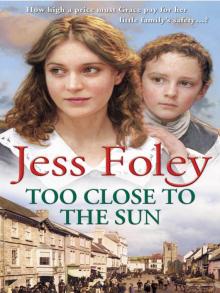 Too Close to the Sun
Too Close to the Sun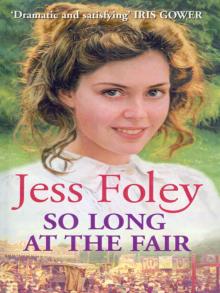 So Long At the Fair
So Long At the Fair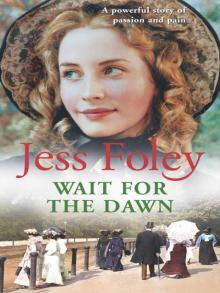 Wait For the Dawn
Wait For the Dawn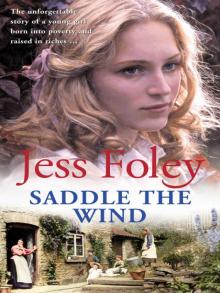 Saddle the Wind
Saddle the Wind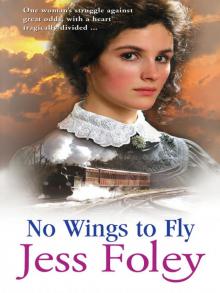 No Wings to Fly
No Wings to Fly